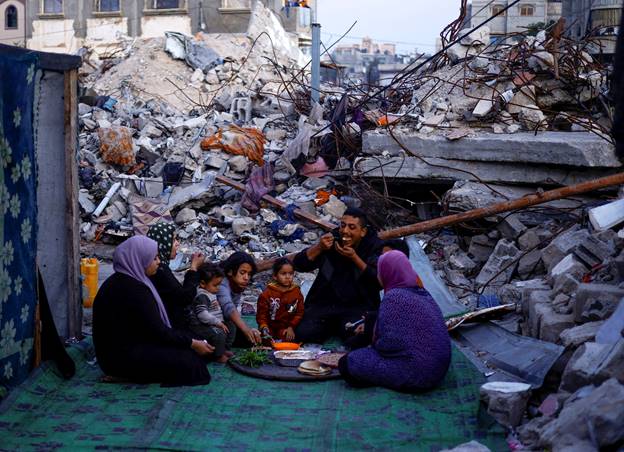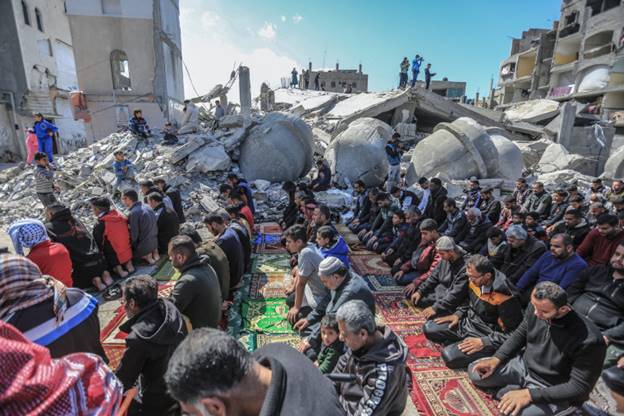

Reuters
Faith in Action: Urgency for the Gazans as Ramadan Approaches
By Hussayn Abdul-Qawi
MPAC Research Fellow
Despite living under persistent artillery bombardments, the people of Gaza are teaching the world a lesson in steadfastness. They continue to pray in rubble which once was a house of worship. They are people whose mothers, daughters, sons, aunts, uncles, and entire generations, have been wiped out of existence. Yet, in the face of unjust use of military force, they remain steadfast. And it is most certainly an unjust use of force. According to Al Jazeera, at least 30,878 Palestinians have been killed since the escalations of violence that occurred on October 7th, with at least 12,300 being children. Neither hospitals nor schools have been spared from the violence and destruction.
Israel’s response has been anything but innocuous. Israeli Prime Minister Benjamin Netanyahu has declared that restrictions will be placed on visitations to Masjid Al Aqsa in Jerusalem, a spiritual refuge and comfort for Muslims. These restrictions continue into Ramadan, the holiest month of the year for Muslims. While President Joe Biden claimed to be working hard for a ceasefire before Ramadan, we have not seen the necessary steps taken to do so except for meager amounts of drops of aid packages via parachutes, unable to guarantee safe distribution in an area raft with warfare.
Ramadan is already upon us. The month in which the Holy Qur’an was revealed is when the Muslim global community fasts from sunrise until sunset – a time in which many Muslims welcome the Holy month with an abundance of prayers, familial meals, laughs, and communal love. Conversely, the people of Gaza will be met with military bombardment, if the war effort persists through Ramadan. According to the Islamic tradition, fasting is prescribed by Allah (God) so that humankind learns self-restraint by abandoning actions that debase the human being. Among those are overindulgence in food and drink, evil speech, lying, and backbiting. God says in the Holy Qur’an in Surah Baqarah (Chapter 2, verse 183), “O you who believe, fasting is prescribed for you as it was prescribed for those who were before you, so that you may learn taqwa (piety).” Indeed, the piety of Palestinian observers of Ramadan amid their trials is a lesson for humanity, for people who are starving will observe the fast, some voluntary, others involuntary. Before October 7th, 1.2 million Gazans suffered from food insecurity. Coupled with Israel’s blockade and control of what flows in and out of Gaza, whatever aid is received depends on the discretion of the IDF, effectively starving the population.

NBC News
In 2023, an article from The New Arab, “ Despite fears of war, Gaza lights up to welcome Ramadan ,” explores the experience of a family whose youth have been deprived of celebrating the rituals that usually accompany the month of Ramadan amongst Muslim communities. Families, left impoverished and unable to buy the necessary items such as food and clean water due to the occupation, remarkably found the strength to celebrate and decorate in Gaza for the sake of their children. Moreover, the article highlights how families found some semblance of the happiness that has been robbed from them. These “few and far” in-between moments of joy will potentially become nonexistent if Netanyahu’s commitment to accelerate the war effort in Gaza is actualized. In the face of relentless bombardment, the resilient people of Gaza continue to stand unwavering, their hearts echoing with praises for God, a testament to their indomitable spirit and steadfast faith amid the harshest adversities imposed upon them by Israel.
Urgency is required from the US administration, the Muslim global community, and anyone who has foundational solid moral principles. President Biden desires reelection, but that may require a change in the rhetoric and his actions regarding Palestine (albeit it may be too late for even that). Thirteen percent of voters voted uncommitted in the Michigan primary, whose constituents have a sizable portion of Arab and Muslim Americans. The Muslim community within the United States and abroad has expressed their frustrations regarding Israel’s military operations. It is incumbent on every able Muslim to aid those who are oppressed with our wealth, our speech, our actions, and our prayers, especially during the month of Ramadan. For Muslims in the United States and across the globe, our supplication holds profound significance as an expression of our solidarity, compassion, and a deep commitment to justice. The power of du’aa (supplication) transcends borders and sociopolitical circumstances and connects believers in a shared spiritual endeavor . In the face of the enduring struggles faced by the Palestinian people due to the perpetration of violence in Gaza, offering prayers becomes a means of seeking mercy, guidance, and protection for the afflicted. It fosters a sense of empathy and interconnectedness among Muslims, fostering a collective consciousness that transcends geographical boundaries.
In a Hadith (narration) reported by one of the great scholars of Islam, Anas ibn Malik reported an event during the Prophet Muhammad’s (PBUH) lifetime in which he was asked, “O Messenger of Allah, should I tie my camel and trust in Allah, or should I leave her untied and trust in Allah?” The Prophet, peace and blessings be upon him, said, “Tie her and trust in Allah.” This tells us that our faith is substantiated by action. If we want ideals such as justice and eradicating oppression, it is incumbent on the people to act. The Islamic tradition’s foremost followers understood that a combination of faith and action is required to address and alleviate problems and societal ills. Especially during Ramadan, our efforts for our suffering brothers and sisters should be magnified on all fronts. We have no moral ambiguity regarding this conflict. Starving people should not be subjected to relentless military bombardment.
In contrast, they attempt to observe fasting with their loved ones while under consistent bombardment, afflicted with countless humanitarian crises. Our wealth, political efforts, voice, prayers, holding the administration accountable, etc., all exemplify “tying our camel,” which is incumbent upon us in the West to prioritize.
Lastly, may Allah (God) lift the suffering of the Palestinians so that they reach the blessed month of Ramadan with peace. And allow us to be instruments in removing their suffering and contributing to the benefit of humanity with our commitment to justice. We should be especially aware of this and learn from these people who have proved their piety in front of the world. - MPAC

